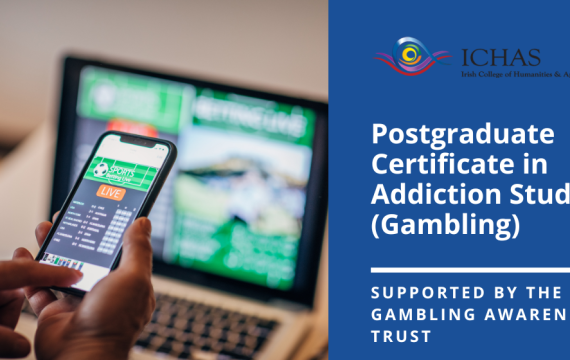
M.A. in Childhood & Adolescent Studies
Bursary information
As part of our affordable access to learning initiative, the college has established a bursary for this programme reducing the cost as outlined below
For details on international fees, please click here
For details on Irish/EU fees please click here
We are delighted to offer you this Master’s programme in Childhood and Adolescent Studies which is primarily designed for graduates in health, human and social sciences related programmes including such disciplines as social care, social work, early years education and care, nursing, Montessori teaching, primary & post primary education, psychology, counselling, psychotherapy, and programmes in cognate areas who wish to study at postgraduate level on either a full-time (over 1 Year) or part-time basis (over 2 Years), who seek to gain specialist knowledge of childhood and adolescent with a view to expanding their knowledge and understanding in the area.
-
Award Title: M.A. in Childhood and Adolescent Studies
-
Duration: 1 Year (Full Time) (Evening Programme) 2 Years ( Part Time)
-
Start Date: September 2024
This programme addresses the needs of practitioners and graduates who wish to develop their knowledge and professional competence in areas focusing on professionally supporting childhood development as well as development throughout Adolescents years. This programme would be of particular relevance to existing Level 8 graduates of programmes in areas such as Early Learning & Care; Primary & Post Primary Education, nursing, social care, psychology, sociology, social science, youth work and community studies and related disciplines.
This programme has been designed to accommodate the needs of both new and recent graduates as well as those students currently holding positions in the children and young people’s workforce, including those wishing to advance their careers or indeed change careers.
Structure of Course
On acceptance of their place on the course, learners are required to attend an induction day. This covers all aspects of the programme content, delivery, assessment, and requirements. Induction provides the learner with an opportunity to become familiar with the environment, peers, and faculty members.
Learners can complete this course on a full-time basis over 1 year and on a part-time basis over 2 years. classes are offered on a blended basis, where student have the option to attend class online of attend class in person in a traditional classroom form. Evening classes will take place from (6 pm to 9 pm) and Saturdays (9.30 am to 4.30 pm) throughout the academic year from September to July.
Those students who exit the programme without completion of their Dissertation will be eligible for an Exit Award of a Postgraduate Diploma in Childhood and Adolescent Studies.
The following are the modules that have to be completed on this course which means a total of 90 ECTS have to completed for the Award of MA in Adolescent Studies. For brief module aims,please click here
| Name of Module | Mandatory / Elective | ECTS (Credits) |
| Critical Perspectives on Child & Youth Development | M | 10 |
| Research Methodologies & Design | M | 10 |
| Governance & Professional Leadership in Child and Adolescent Practice | M | 10 |
| Practicum | M | 10 |
| Dissertation | M | 30 |
Student Choose one of the following elective modules
| Curricular & Pedological Approaches in Early Learning | E | 10 |
| Interventions & Models of Care in Adolescent Practice | E | 10 |
Students Choose one of the following elective modules
| Contemporary Discourses in Early Learning and care | E | 10 |
| Contemporary Discourses in Youth Studies | E | 10 |
Semester 1
Each learner on the Full-Time route would study and submit for assessment 4 modules in Semester 1 (40 ECTS), while those on the Part-Time Route would submit 2 Modules (20 ECTS).
Learners focus on fundamental Modules associated with the programme and on the full-Time option, are also taught a 10 ECTS Module on Research Methodologies and Design to support them with their Dissertation Module.
Semester 2
In Semester 2, learners on both the Full-Time and Part Time options will complete a total of 30 ECTS of topic focused learning as well as commencing their Practicum module (10 ECTS) and are assessed on this body of work by the end of the First Semester. Students will undertake a minimum of 150 hours of direct engagement in child or adolescent practice in approved settings or engage in other project work associated with such practice during their Practicum module. All learners will be supported with 15 hours of supervision arranged by the College, 10 of which would be mentoring or small group tutoring with 5 hours of direct 1 to 1 placement supervision
Semester 3
Students will complete the Programme on submission of their Dissertation Module at the end of Semester 3 on the full-time route and Semester 5 of the Part-time route.
Semester 4 (Part Time)
In Semester 4 student on the Part-Time Route would submit 2 Modules (20 ECTS).
Semester 5 (Part Time)
In Semester 5 learners will complete their Placement (work-based learning) (10 ECTS) and their Dissertation(30ECTS)
Those students who exit the programme without completion of their Dissertation will be eligible for an Exit Award of a Postgraduate Diploma in Childhood and Adolescent Studies.
The following are the modules that have to be completed on this course which means a total of 90 ECTS have to completed for the Award of MA in Childhood and Adolescent Studies
How are learners assessed on this course?
This course has been designed to enable learners to demonstrate their academic and reflective learning in appropriate ways. Through a range assessment tools and approaches to allow for assessment of differing learning outcomes as well differing learning styles and situations. The range of assessment tools/ tasks normally include:
- Written Assignments (e.g. Essay, Written Report, Research Proposal)
- Projects (Individual and Group)
- Practical Assignments
- Individual and group presentations
- Terminal Examinations
- Learning Journals or Portfolios
At the start of each academic year, learners also receive a Programme Handbook, which supplements the Student Handbook. The Programme Handbook contains the specific academic information relevant to the individual’s programme, module descriptors, learning outcomes, associated assessment strategies, book lists, and academic calendars are published on the LMS.
What supports are available to learners
At ICHAS, every lecturer and member of staff is committed to excellence in education and professional practice. Each Module has a Module Leader who works with learners to enhance their learning and will provide formative and summative feedback throughout every module. Each programme has a Programme Co-ordinator and in addition, you will have direct access to the Programme Leader and the Director of Graduate Studies.
The Dissertation and Practicum are central elements of the Masters programme. Each learner will undertake these modules under the direction of an Academic and Practicum supervisor respectively for these modules.
Who Awards My Qualification?
On successful completion of the programme, your qualification is awarded by Quality and Qualifications Ireland (QQI). QQI is one of the principal Irish awarding bodies for 3rd level education in Ireland and sets the standards for awards on the NFQ. Because this programme is both validated and awarded by QQI, the Award you receive is recognised in Ireland and internationally. See www.qqi.ie for further information.
Where Can I progress to on completion of the course?
On successful completion of the MA in Childhood & Adolescent Studies, learners will be qualified to access Level 10 Programmes on the National Framework of Qualifications (NFQ).
The knowledge, skills, and competence required to successfully participate in and complete this Level 9 programme will normally require applicants to have successfully achieved a Level 2:2 award in a relevant Level 8 degree.
Those who have completed other relevant educational programmes or have relevant professional experience etc., where Recognised Prior Learning (RPL) and Acquired Prior Learning (APL) can be applied to the programme by submission of programme content, qualification, and assignments equivalent to an appropriate Level 8 award at an Honours 2:2 standard, can also be considered. Candidates over 23 years of age who hold significant professional qualifications and or can demonstrate appropriate learning from experiential or other sources of learning may apply through a Recognition of Prior Learning route (RPL). For non-native speakers of English, an IELTS score of 6.5 (or equivalent) is required. Candidates may study on either a full-time or part-time basis.
All applicants will be required to attend for interview to ascertain their suitability for the programme.
In the case of overseas applications, whose first language is not English, applicants will have to provide either certification of completion of a primary degree through the medium of English or submit the official results of English Language competency demonstrated through the completion of English language proficiency tests indicating a minimum score of to B2+ in the Common European Framework of Reference for Languages (CEFRL). Certification may be evidenced through the production of a certificate of IELTS Level 6.5 or equivalent) or equivalent competency tests, if applicable.
All international applicants must meet the visa requirements for study in Ireland.
Successful applicants would be required to complete Garda Vetting at the College.
If you have any queries in relation to this course then please contact the college on 061 216288 or email us at info@ichas.ie. A member of the Admissions team will be happy to assist you
- This programme is congruent with the objective of providing accessible and flexible programmes to adult learners and has been designed with particular emphasis on the use of blended learning technologies to support traditional classroom learning
- This programme supports learners to develop personally & professionally to enable them to achieve a Masters Degree in Childhood Studies.
- Develop learners knowledge, skills & competence to an appropriate level of ‘Higher Order Practice’
- Modules within the programme are designed to build personal capacity, collaborative problem-solving skills, and an understanding of the systems and context within which individuals may be best supported.
- The programme provides a progression opportunity to complete a range of Programmes at Level 10 nationally and internationally.
A central component of the ICHAS vision is the provision of flexible and affordable education for all, with this in mind the college has established a bursary for this programme reducing the tuition fees as outlined below
Tuition fees
For details on international fees and bursaries available, please click here
For details on Irish/EU fees please click here
Click to apply for this programme
Available at our Dublin and Limerick CampusesFeatured Courses

Postgraduate Certificate in Addiction Studies (Gambling)
The programme specifically aims to increase practitioner awareness and enhance relevant skills and competencies to engage with those with Gambling Addiction and to support them in their journey towards recovery
FIND OUT MORE
Introduction to Belief and Disbelief in the age of atheism: Psychospiritual Counselling
This course will introduce attendees to some of the skills and techniques adopted by psychospiritual therapists, explore the various philosophies that underpin clinical practice and provide.............
FIND OUT MORE
Introduction to Internal Family Systems
Over 3 evenings the course will look at the background and key aspects of Internal family systems and how it can help practitioners to understand themselves and their clients more completely. It will have both didactic and interactive elements and will focus on how...............
FIND OUT MORE























